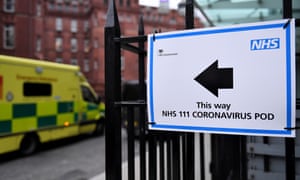Ireland has recorded a second case of coronavirus but plans to go ahead with St Patrick’s day festivals.
Health officials revealed the second case – a female in the east of the country who recently travelled from northern Italy – on Tuesday night. The infection is not related to the Dublin schoolboy who was diagnosed last weekend after he also visited northern Italy.
The foreign affairs ministry updated its travel advice to warn against non-essential travel to the Lombardy, Veneto, Piedmont and Emilia-Romagna regions.
The chair of Ireland’s coronavirus advisory group, Cillian de Gascun, told RTE on Wednesday there was still no evidence of community transmission in Ireland. However he said the situation was fluid and noted that two weeks ago Italy had only three cases and now had more than 2,000.
The chief medical officer, Tony Holohan, said the second infection was “not unexpected” and that Ireland remained in a containment phase. He said that “as things stand” the celebrations leading up to St Patrick’s Day on 17 March could go ahead.
Meanwhile Google asked most staff at its European headquarters in Dublin to work from home for a second day pending an update on an employee who on Monday showed flu-like symptoms.

Public Health England have suggested it may recommend that people stop shaking hands “although we’re not there yet”.
Its emeritus medical director, Prof Paul Cosford, said:
We may get to a point where if we see more widespread infection we ask people to limit the social contact they have with each other.
This could include limiting everyday interaction, although we’re not there yet. What’s most important at the moment is that people practice good hand and respiratory hygiene and wash their hands frequently and thoroughly.
Our message is clear, simple handwashing with soap for 20 seconds is key to good hygiene and this will make a real difference in stopping this virus spread.
On Monday, when the German chancellor, Angela Merkel, extended her hand to her interior minister, Horst Seehofer, at a meeting on Monday, he refused her handshake and waved her away amid concerns about spread of covid-19

The NASUWT, one of the largest teaching unions in the UK, has written to the Department for Education in England and its counterparts in Wales, Scotland and Northern Ireland, urging them to extend their coronavirus advice to schools to address a surge in incidents of racism and xenophobia.
The union says it has received increased reports of black and minority ethnic teachers and pupils being subjected to “racist name-calling and intimidation” connected to the Covid-19 outbreak.
Chris Keates, the union’s acting general secretary, said:“The NASUWT is extremely concerned at the extent of increased incidences of abuse, prejudice, xenophobia and racism as a result of the coronavirus (COVID-19).
“Misinformation and false reporting about the coronavirus, its causes and how it is spread have fuelled fear and panic and in some cases led to the ostracising of people of East Asian heritage and others perceived to be ‘foreign’ or an ‘immigrant’ within the UK.
“Unfortunately, schools and colleges are not exempt from the associated xenophobic and racialised stereotyping of Chinese and other east Asian people. The NASUWT has received reports of increased covert and overt racial attacks perpetrated against some minority ethnic pupils and NASUWT members linked to coronavirus concerns.
“The NASUWT is urging the Department for Education to communicate with schools and provide guidance and support for school leaders.”
A hospital staff member in the north-west of England has been confirmed as a case of the new coronavirus.Although the patient is believed to have contracted the virus in Italy, the case is the latest example of a health worker succumbing to it.
A spokesman for the North Cumbria Integrated Care NHS Foundation Trust said: “The trust can confirm that a member of hospital staff has tested presumptive positive for Covid-19 following a trip to northern Italy. On returning from the trip, the member of staff sensibly self-isolated and did not come into work or have any contact with patients.
“We can assure the public that the risk remains low. The trust is operating normally and there is no need to cancel any appointments.”
On Monday, a clinician at Hertfordshire Mount Vernon Cancer Centre was initially confirmed positive for the virus but then tested negative.
A family doctor in Brighton and a member of staff at Worthing hospital, West Sussex, were among the first coronavirus cases to be identified in Britain last month.
There were concerns last week that a Surrey GP may also have been infected. The regional director for Public Health England said on Monday that none of the four patients in a cluster in the county were GPs or health workers.
Updated
Coronavirus is likely to be spreading undetected in the UK already, with health officials on the brink of moving into the phase of “delaying” rather than trying to “contain” transmission, the chief medical officer has said.
Chris Whitty, who is helping to lead the government’s response, said it was “likely, not definite, that we will move on to onward transmission and an epidemic here in the UK”.
Speaking on BBC Radio 4’s Today programme, Prof Whitty said the UK was almost in the second phase of the government’s strategy of trying to contain, delay, research and mitigate the virus.
“When I was here previously, we were firmly in contain stage. Now I think we are on the borderline between containing and delaying. But many of the things you do to contain it also delay it.”

Whitty gave his assessment as the government designated coronavirus a notifiable disease, which means some companies will be able to seek insurance compensation for coronavirus cancellations.
The move brings England into line with Scotland, Northern Ireland and Ireland, which have already added coronavirus to their lists of notifiable diseases.
Updated














